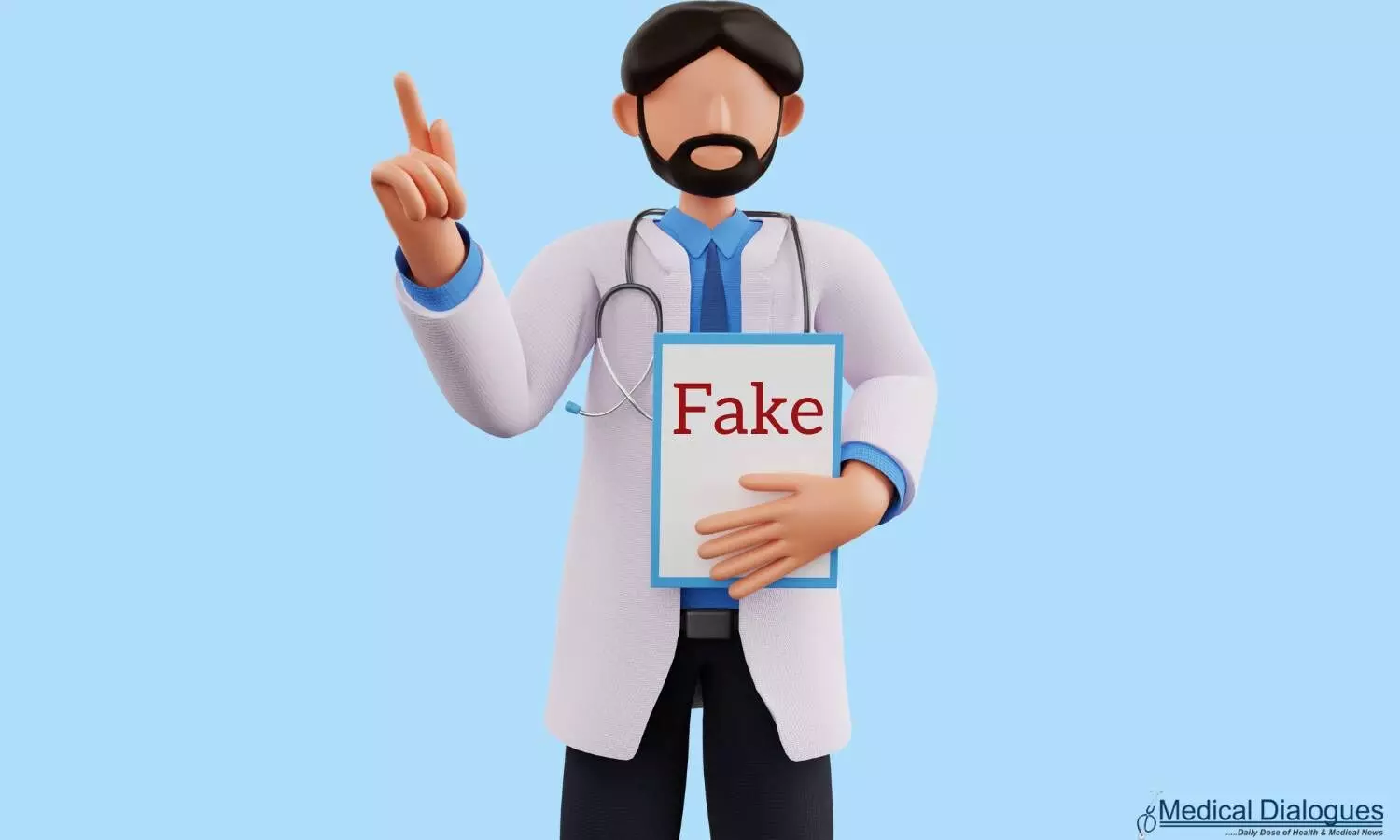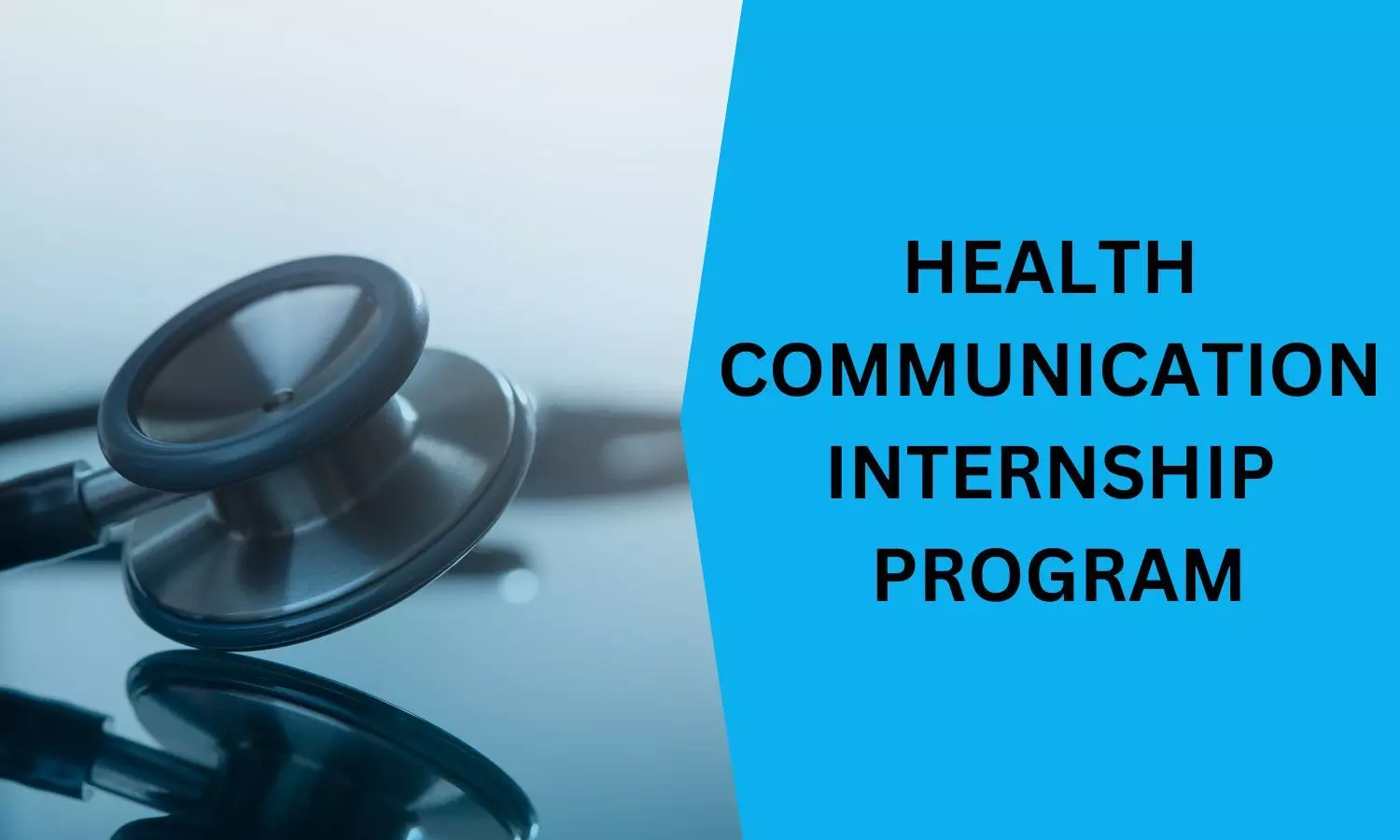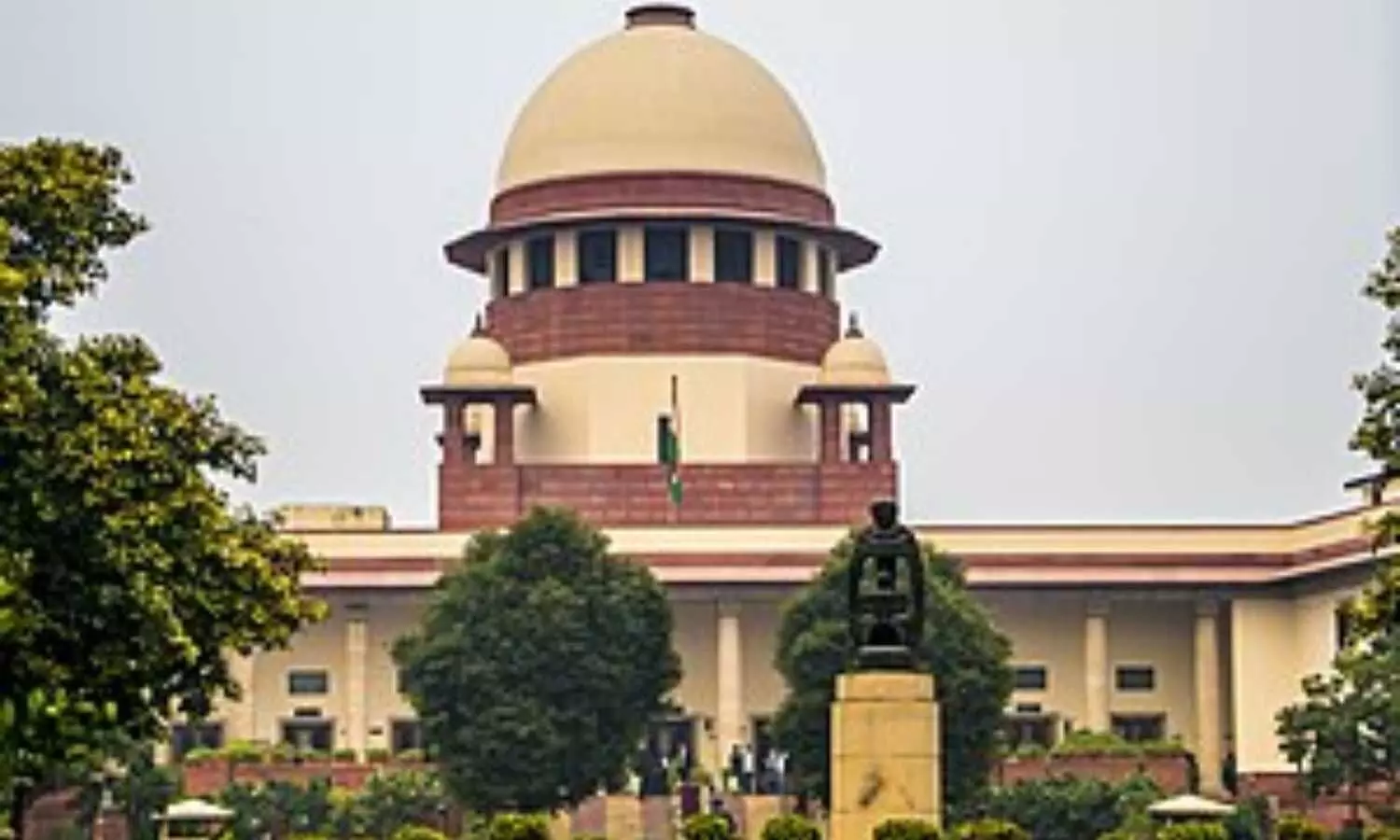First over-the-counter birth control pill expected in stores within weeks: What patients need to know
Powered by WPeMatico
Powered by WPeMatico
Powered by WPeMatico
Powered by WPeMatico
Powered by WPeMatico

Mumbai: In a significant step to combat the growing menace of quacks in the state, the Maharashtra Medical Council (MMC) is developing a new mobile application known as “Know Your Doctor,” for patients to become aware if they are receiving treatment from any unqualified medical practitioner.
The council members alleged that the app will empower patients by giving them easy access to crucial information about their medical practitioners in Maharashtra. They claimed that the app will help patients verify the credentials of any registered medical practitioners in the state.
The initiative has been taken given the ongoing emerging reports regarding fake doctors practising medicine for an extended period and deceiving patients with improper treatments which had detrimental effects on the health of some individuals.
Also read- Quack Practising For 40 Years Arrested In Guwahati
It has been asserted that the council will use the app to acknowledge registered practitioners and provide guidance to patients to prevent them from seeking treatment from unregistered or unqualified individuals.
Speaking to HT, Dr Vinky Rughwani, the newly appointed administrator of MMC said, “There have been several news reports on bogus doctors, and it is a major challenge. The app will help patients verify if the doctor they are visiting is qualified, their degrees, and their MMC registration number.”
“It will be a unique app in the country, and no council has attempted this before. With the widespread use of smartphones, even in rural areas, we aim to empower patients with information on their doctors. We are in the process of streamlining the standard operating procedure for registered doctors,” he added.
Furthermore, Dr Rughwani stressed the council’s commitment to not only accelerating the development of the application but also giving priority to addressing 692 unresolved complaints, including cases of medical negligence.
“Most of the cases are of medical negligence. We have decided to get help from medical experts from the respective fields. For example, if the complaint is related to gynaecology, we will take the gynaecologist’s help to review the complaint and hearing. We plan to hold a hearing every week to finish the backlog,” he added.
Also read- Odisha HC Directs OCMR To Devise Methods To Curb Fake Doctors Menace
Powered by WPeMatico

Kerala- For the first time in Kerala, Innovation and Entrepreneurship Development Centers (IEDCs) will be established in medical colleges to entice doctors and medical students to engage in innovation and entrepreneurship within the health-tech and med-tech sectors within the state.
This will be the first time that IEDCs will be functional in medical colleges in Kerala. Till now, these IEDCs were operational in all the engineering, arts and science colleges of the state.
In early 2023, KSUM and Kerala Medical Technology Consortium (KMTC) had also submitted a proposal for this startup innovation centre initiative.
KSUM and the Kerala Medical Technology Consortium (KMTC) had submitted a proposal in early 2023 regarding this, he added.
Speaking to The New Indian Express, Anoop Ambika, CEO of Kerala Startup Mission (KSUM) said “This will develop a robust health-tech and med-tech startup ecosystem in the state. This is the era of precision medicine. A lot of advancements are being made in the med-tech sector. So, the thought that the doctors and medical students who are continuously in contact with the patients and also dealing with diseases would be a better choice to come up with innovative products led to the idea of setting up IEDCs in the medical colleges in the state”.
Mr Anoop further added, “Things are changing at a fast pace. The disease identification process is changing and the Internet of Things (IoT) is being used for drug delivery”.
On the other hand, IMA state president Dr Joseph Benaven also said “This was one of IMA’s top priority agendas. We wanted to introduce doctors to innovation and entrepreneurship. Innovations in the medical and healthcare sectors can happen only with the intellectual inputs obtained from the doctors. Hence, we put a thrust that doctors too need to be involved in this and motivate them to take up entrepreneurship”.
He further added “Nothing happened. Then, the IMA started pushing the idea and met up with the chief secretary, IT secretary, health secretary and the KSUM. We didn’t have an inkling during that time that a proposal was already before the state government”.
Mr Benaven also said “After a series of discussions, the state government formed a core committee which comprises representatives from the KSUM, KMTC, IMA and Kerala University of Health Sciences (KUHS),” said Dr Benaven. According to him, doctors don’t come into startups because they are not aware of it. “However, a lot of younger generation of doctors have shown interest towards startups. It is the need of the future and we need doctors to get into it so that we have a very robust healthcare and med-tech ecosystem”.
Furthermore, explaining more about the proposal, a KSUM official said “The functioning of the IEDCs that have been proposed at the medical colleges will be slightly different from those set up in the Engineering and Arts and Science colleges. The doctors and the medical students will provide the problem statements and data along with full insights. However, their team will also have engineering graduates from the nearby colleges to help them out with the technical aspects needed to develop and manufacture the product”.
“The idea and the product will be theirs. The engineering graduates will be just providing them with the necessary technical know-how to develop the product,” said the KSUM official. However, as of now, no details have been released as to when the IEDCs will start functioning in the medical colleges. As a start, workshops and classes will be held at Thiruvananthapuram, Ernakulam and Kozhikode medical colleges that will see the participation of medical professionals from not only government medical colleges but also private institutions. “The first workshop will be held at Thiruvananthapuram followed by Kozhikode and then Kochi on March 12, 15 and 22, respectively”, the official further added.
“All the regular funding schemes like the innovation grants and seed loans are available for future med-entrepreneurs from the medical colleges”, the KSUM added
Powered by WPeMatico

Chennai- In a bid to enhance dental services in Tamil Nadu, the Health Department has decided to establish multi-speciality dental centres across the state. These centres will be set up within four government medical college hospitals situated in Madurai, Salem, Coimbatore, and Tirunelveli.
It has been decided that these multi-speciality dental centres will be set up at a total cost of Rs 4.50 crore.
On this, a new Government Dental College and Hospital was also inaugurated at Pudukottai a few months ago with the aim of enhancing dental care in the government sector within the state. Furthermore, additional floors have been approved for the Tamil Nadu Government Dental College and Hospital in Chennai. Now, the specialised dental centres in the Government Medical College Hospitals of Kerala are the latest addition to the emphasis on improving dental facilities.
As per The Hindu media news report, on a statement issued on Friday by Health Minister Ma. Subramanian said, “₹1.05 crore would be spent towards the construction of these dental centres, and dental equipment worth ₹3.45 crore would be provided for the four medical college hospitals”.
Mr Subramanian further added “There are only a few specialised centres to provide oral care, and because of this people find it difficult to get prompt treatment for oral and dental health issues. This affects the health of people as well”.
Lastly, the Health Minister also announced that the allocation of ₹35.63 crore for infrastructure development at the Palayamkottai Government Siddha Medical College has been done. An outpatient building, a men’s hostel, and an academic building would be constructed.
The initiative to set up multi-speciality dental centres in the government sector has been taken to provide specialised dental care services to the public at par with the private sector in the state.
Powered by WPeMatico

New Delhi- The Indian Council of Medical Research (ICMR) will organise the ICMR Health Communication Internship Program (IHCIP) in May-July 2024. On this, ICMR is inviting applications for the program and has also released a notice giving details of the internship program.
ICMR Health Communication Internship Program is a full-time opportunity designed to be an enriching experience in public health communications. This year, IHCIP will admit a maximum of 30 trainees. The duration of the program is for 3 months and each candidate will get Rs. 10,000/- per month during the program. ICMR will also issue a certificate on completion of the internship program and submission of a report duly countersigned and approved by the competent authority.
APPLICATION PROCESS
Candidates interested in participating in IHCIP 2024 must fill out the application form and submit the documents specified in the form. The application form link is mentioned in the notice through which candidates can register themselves for IHCIP. The last date for filling out the application is 31 March 2024 till 5 pm.
SELECTION PROCESS
The selection process for IHCIP is based on two rounds of screening. Where in the first round, the applications will be scrutinised based on undergraduate/and postgraduate mark sheets submitted by the candidates. Meanwhile, the second round of screening will be based on the answers to the essay questions given in the application form. Lastly, a merit list will be released which will include the candidates who score the highest marks at the end of both the rounds of screening.
REQUIREMENTS
1 Candidates should be Indian citizens who are currently in the final year of undergraduate or are enrolled in post-graduation in communications and journalism courses and public health courses, from a recognised university.
2 Candidates who have completed their under-graduation/post-graduation not more than 2 years before the date of commencement of this program (i.e. year of completion is 2022 or 2023) are also eligible to apply.
3 Candidates who have completed undergraduate are required to have at least a 55% aggregate percentage or CGPA of 5.7 and above. Candidates who have completed postgraduation are required to have at least a 50% aggregate percentage or CGPA 5.2 and above.
4 Candidates currently enrolled in undergraduate or graduate programs are required to have 55% and 50% aggregate percentage of all semesters respectively or an SGPA of 5.7 and 5.2 respectively.
5 The age of the candidate should not exceed 28 years as of 31st December, of the year of the internship
6 Candidates should possess excellent verbal and written communication skills in English and a regional language (including Hindi).
7 Candidates should be proficient in Microsoft Word, Microsoft Excel, Microsoft PowerPoint, Canva, Adobe Photoshop, and/or other design tools.
LIST OF ELIGIBLE COURSES
1. BSc. / MSc. In Public Health / Master’s in Public Health (MPH)
2. B.A. / M.A. in Journalism and Mass Communications
3. Bachelor of Mass Media (BMM) / Master of Mass Media (MMM)
4. Bachelor of Science (BSc) / Master of Science (MSc) in Mass Communications
5. B.A./ M.A. in Media and Communication Studies
6. B.A. / M.A. in English with specialization in Journalism
7. B.A. / M.A. in Communication Studies
8. Bachelor of Journalism / Master of Journalism (BJ / MJ)
9. B.A./ M.A. in Visual Communication
10. B.A. / M.A. in Digital Media and Communication
11. B.A. / M.A. in Film and Television Production
12. M.A. / Diploma Course in Development Journalism
13. Postgraduate Diploma in Journalism (PGDJ) (Any language)
14. Postgraduate Diploma in Radio and TV Journalism
15. Postgraduate Diploma in Mass Communication (PDGMC)
16. Postgraduate Diploma in Advertising and Public Relations
17. Postgraduate Diploma in Digital Media
ACTIVITIES
The activities and tasks that a trainee will be expected to perform as part of the program are mentioned below
1 Closely work with the Nodal Communications Officers of their assigned ICMR institute in designing communications campaigns for bettering the health of the country within the ambit of the Institute’s health research.
2 Based on the research work done by the institute, support the following:
a. Supporting community engagement research and programs as required by the institute.
b. Developing IEC materials, social media graphics and media collaterals, including first drafts of press releases and opinion editorials for information dissemination.
c. Supporting the institute in conducting webinars/lectures/workshops.
d. Develop and present a capstone project on health communications to ICMR.
3 At the end of the program, candidates will have to submit a detailed report on the work done to ICMR. It should be noted that all outputs generated during the internship will be the intellectual property of ICMR and cannot be used by the intern without the prior approval of the organisation.
TERMINATION OF INTERNSHIP
ICMR may terminate the engagement of an intern due to non-compliance with program guidelines or other reasons as it deems fit, without giving any reason to the intern. The decision of ICMR will be final in this regard. In case of exceptional circumstances, an intern may choose to terminate their internship after giving prior notice of 10 days to ICMR.
To view the official notice, click the link below
Powered by WPeMatico

New Delhi: Delivering an interpretation of the powers vested in the appropriate authorities under the Pre-conception and Pre-natal Diagnostic Techniques (Regulation & Prevention of Misuse) PC PNDT Act, 1994, the Supreme Court of India recently clarified that the authorities can only suspend/cancel the registration of hospital/clinic under Section 20(3) of the Act when such an action is believed to be necessary in the public interest.
“…in our view, the power of subsection (3) of Section 20 of PC&PNDT Act is notwithstanding the power of subsections (1) & (2) of Section 20. The said power can only be exercised when the appropriate authority forms an opinion that it is necessary or expedient in public interest to do so. It is incumbent upon the appropriate authority to form its opinion based on reasons expedient or necessary to exercise the power of suspension,” opined the top court bench comprising Justices J.K. Maheshwari and K.V. Vishwanathan.
These observations were made by the bench while considering a plea involving the suspension of registration of a private hospital based in Ahmedabad. The hospital was registered under the PC&PNDT Act and the said registration was valid up to 23.05.2015. However, based on a complaint, an inspection was conducted on 21.10.2010 and during the inspection, the authorities found some lapses contravening the provisions of PC&PNDT Act. Consequently, the sonography machine operated in the hospital was seized.
A few days later, without giving any notice to the hospital, the authorities passed an order suspending its registration in exercise of the power under Section 20(1) & (2) of the PC&PNDT Act. Thereafter the appellate authority asked the appropriate authority to pass a suitable order within 15 days and to clarify whether the order dated 25.10.2010 was passed in exercise of power under Section 20(1) & (2) or under Section 20(3) of PC&PNDT Act.
Accordingly, the appropriate authority passed a fresh order on 29.12.2010 saying that there is a breach of mandatory provisions and the authorities accordingly suspended the registration of the hospital under Section 20(3) of PC&PNDT Act in public interest till finalization of the criminal proceedings.
Challenging this, the hospital approached the Gujarat High Court and allowing the plea, the Single Judge bench observed that looking to the condition of foetus in the womb, once the patient has consented to abortion, she cannot make a complaint for alleged violation of provisions of PC&PNDT Act. Further, the High Court found that neither any notice was issued nor an opportunity of hearing was afforded before passing the order suspending the registration.
It was further held that while passing the first order of suspension on 25.10.2010, powers were exercised by appropriate authority under Sections 20(1) & (2) of PC&PNDT Act without affording an opportunity of hearing, which was contrary to the spirit of the said provisions and wholly unjustified. The single judge order was upheld by the Division Bench as well.
The Division Bench was of the opinion that all the cases of suspension would not automatically fall within the purview of Section 20(3) of the PC&PNDT Act. Further, the bench observed that the reasons assigned in subsequent order of suspension by the appropriate authority are not valid to exercise such power in public interest.
Ultimately, the matter reached the Supreme Court. The counsel for the appellant authority submitted that on the scope of Section 20(1), (2) & (3) of the PC&PNDT Act, there is no judgment of the Apex Court.
Relying on the judgment of Malpani Infertility Clinic Pvt. Ltd. vs. Appropriate Authority, the counsel for the authority urged that if power is exercised by appropriate authority to suspend the registration due to pendency of the prosecution, such power may be exercised in public interest under Section 20(3) of PC&PNDT Act.
It was contended that looking at the object of PC&PNDT Act, if the appropriate authority considers that the activity of the licensed entity is affecting the public at large, the power to suspend the registration or license is permissible.
On the other hand, the counsel for the hospital submitted that considering the tenor of the order passed by the appropriate authority and the reasons so stated, it cannot be said to be an order suspending the registration in the public interest.
Referring to Section Section 20(1), (2) & (3) of PC&PNDT Act, the Supreme Court noted, “Bare reading of the aforesaid provisions makes it clear that Section 20(1) & (2) deals with both suspension or cancellation as the case may be, while Section 20(3) only deals with suspension in public interest. The authority, … affording reasonable opportunity of hearing and having regard to the advice of the Advisory Committee and on being satisfied that there was a breach of the provisions of the PC&PNDT Act or the Rules, without prejudice to any criminal action, may suspend or cancel its registration as the case maybe. Meaning thereby that for breach of the provisions of the PC&PNDT Act and the Rules, power of suspension for such period as may deem fit or of cancellation may be exercised parallelly by the appropriate authority.”
Meanwhile, “SubSection (3) of Section 20 only deals with suspension and confers independent power to the appropriate authority irrespective and notwithstanding the power under subsections (1) or (2) of Section 20. The said power may only be exercised by the appropriate authority if the said authority is of the opinion that exercise of such power is necessary or expedient in public interest. Meaning thereby that the exercise of such power of suspension by appropriate authority is in a contingency where it is expedient or necessary to take immediate action in public interest. While exercising such power, it is incumbent on the authority to form an opinion for reasons to be recorded in writing to indicate the said public interest. The said power is not akin to the power as specified in subsection 2 of Section 20 of PC&PNDT Act and the Rules thereto,” noted the Apex Court.
The bench perused the order dated 25.10.2010 and noted that the said order cannot be said to be an order under subsection (3) of Section 20 of PC&PNDT Act.
“In fact, it is simplicitor an order passed under subsection (2) of Section 20 alleging contraventions of the provisions of PC&PNDT Act and the Rules. Therefore, we have no hesitation to say that the appellate authority, while remanding the matter vide order dated 21.12.2010, was not required to ask the appropriate authority to clarify whether the order of suspension was under subsection (3) or under subsections (1) & (2) of Section 20 of PC&PNDT Act,” the bench noted at this outset.
The Supreme Court bench also took note of the suspension order dated 29.12.2010 passed in the public interest and noted,
“Perusal of the above order reveals that the appropriate authority while passing the order sought to exercise power under subsection (3) of Section 20 of PC&PNDT Act and directed suspension of the registration of the clinic till finalization of the criminal proceedings because of the contraventions of the provisions of the PC&PNDT Act and the Rules. Therefore, it is said to be contrary to the public interest and such activity is required to be curbed.”
While clarifying the legal provisions, the bench opined that the power of subsection (3) of Section 20 of PC&PNDT Act is notwithstanding the power of subsections (1) & (2) of Section 20. The bench held that the said power can only be exercised when the appropriate authority forms an opinion that it is necessary or expedient in public interest to do so.
“It is incumbent upon the appropriate authority to form its opinion based on reasons expedient or necessary to exercise the power of suspension,” opined the bench.
Referring to the order dated 29.12.2010, the bench observed that the order does not contain reasons as required to form an opinion that it is necessitated or expedient in public interest to exercise the power of suspension.
“Therefore, in our view, it does not fulfill the requirement of subsection (3) of Section 20 of PC&PNDT Act. As per the above discussions, neither the first order of suspension dated 25.10.2010 nor the second order of suspension dated 29.12.2010 qualifies the requirement of subSection (3) of Section 20 of the PC&PNDT Act. The said view is fortified by the reasoning recorded by the learned Single Judge and Division Bench which we find just and concur by its reasoning. Therefore, we are not inclined to interfere in this appeal,” the Court observed.
At this outset, the bench also referred to the intendment of Section 20(2) and Section 20(3) of PC&PNDT Act and clarified that
“…if the appropriate authority finds breach of provisions of PC&PNDT Act or the Rules it may, after issuing notice and giving a reasonable opportunity of being heard, without prejudice to any criminal action against the licensed entity, suspend its registration for such period as it may think fit or cancel the same as the case maybe.”
The bench noted that the appropriate authority also has power under subsection (3) of Section 20 notwithstanding the power under subsection (1) & (2) of Section 20. In the said situation in case, the authority forms an opinion that it is necessary or expedient in public interest, then after recording reasons in writing, it may suspend the registration of the licensed entity without notice as specified in subsection (1) of Section 20.
“Thus, the power of subsection (3) is intermittent and in addition to the power of subsection (2) but it may be exercised sparingly, in exceptional circumstances in public interest. In our view, the power of suspension, if any exercised, by the appropriate authority deeming it necessary or expedient in public interest for the reasons so specified, it should be for interim period and not for an inordinate duration,” opined the bench.
Considering this legal position, the bench took note of the fact that the suspension order dated 25.10.2010 was passed without any notice or affording any opportunity for hearing as per subsection (2) of Section 20. Therefore, the bench opined that it was not justified and has rightly been set aside by the Single Judge bench and confirmed by the Division bench. With this observation, the bench dismissed the plea by the authorities and upheld the High Court orders.
“Since the order under challenge has been implemented and the hospital is operational, therefore no further consequential orders are required to be passed directing to revive the registration. In the facts and circumstances of the case, there shall be no order as to costs,” noted the bench.
To view the order, click on the link below:
https://medicaldialogues.in/pdf_upload/supreme-court-order-pcpndt-233989.pdf
Also Read: Settlement between parties not accepted for offences under PCPNDT Act: Gujarat HC
Powered by WPeMatico

New Delhi: The Delhi All India Institute Of Medical Sciences (AIIMS) has said that the problem of poor eyesight in children has increased in the last 10 years.
While earlier this problem was present in 13 to 15 per cent of children, it has increased to 20 to 25 per cent in the last 10 years.
That means if there are 50 children in a classroom, then out of them there will be 15 to 20 children who require glasses.
Dr Rohit Saxena, professor of ophthalmology and pediatrics, RP Center at AIIMS, said that in earlier times, only 3 to 4 per cent of children required spectacles but now this number has increased.
Also Read:AYUSH-ICMR Advanced Centre for Integrated Health Research launched in AIIMS
“Earlier, the problem of vision defects was seen in children 10 to 12 years of age. But now, at the age of 6 to 7 years, the eyesight of children has started deteriorating and they need to wear glasses,” said the doctor.
Not only this, but the doctor also said that even children under 4 years of age are facing the problem of myopia, or vision defect and the reason for its increase is the continuous use of gadgets like mobile phones, tablets, etc. in children.
Children keep using mobile phones and other gadgets for many hours and parents do not interrupt them, Dr Rohit said, adding that before Corona, when parents used to come to us, they used to complain about television hours and ways to solve them.
“But now parents say that he uses the phone only for 2 hours, which means that there has been a change in the mentality of the parents, which is affecting the eyesight of children,” he added.
Dr Rohit Saxena said that if children are studying online, then parents should ask them to study on a computer or laptop only and use smart screens for entertainment.
“The distance should be equal to one hand and if the distance is greater than that, then it will also be fine,” he added.
Professor Dr Saxena of the RP Center said that in the last 30 years, the problem of poor eyesight in children has increased rapidly. In this regard, the countries of East Asia are at the forefront. This includes countries like China, Singapore, and Hong Kong.
“In the countries of East Asia, 80 to 90 per cent of children suffer from visual impairment. Not only this, if we talk about India, this problem is continuously increasing among children in India,” said the doctor.
“Especially earlier, we used to think that the problem of visual impairment was less common in children in rural areas, but now the figures coming out show that even in rural areas, the problem of visual impairment is seen in small children. This means that even in those areas, the use of mobile phones and other gadgets has increased among children,” he said.
Dr Rohit said that in the data collected from rural areas in the last 10 years, earlier, 3 to 4 per cent of children had the problem of visual impairment, which has now increased to 7 to 8 per cent.
The doctor said that it is very important to increase digitalization, which is a good thing. People are becoming aware of this, even in rural areas. Along with this, excessive use of mobile phones, tablets and other gadgets is harmful to children.
“Parents need to be made aware of this and will have to explain this to their children since young minds are not aware of the potential damage,” he stated.
In such a situation, there are some symptoms. If the symptoms are visible in your child, then pay attention to them. For example, if the child is not able to copy the homework from the board in the class, if the child is copying homework from the other child’s notebook, or if the child is watching the board with eyes slightly closed.
Additionally, if the child is watching TV very closely, reading books very closely or has watery eyes and is used to constant rubbing of their eyes, these are all symptoms of a vision defect or myopia.
Regarding this, parents should immediately take their children to the doctor and get their eyes checked.
Along with this, if children use the phone continuously or have to do homework online, then parents should keep in mind that they must take a 5-minute break every half hour and always keep their computer or laptop near the window so that their children keep looking outside while studying.
Along with this, if possible, study in the open on the balcony or terrace. Children need to go out 2 hours during the day in the morning or anytime before evening.
Powered by WPeMatico
